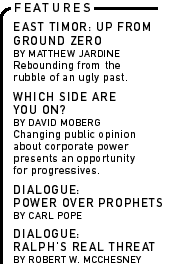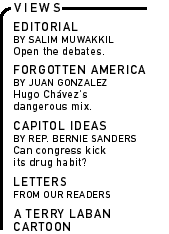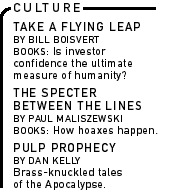 
|

|

|

|
| |
|
|
|
Enough is enough. The more pieces I read like Robert W. McChesney's brief for voting for Ralph Nader, the more I despair for any real self-reflection among progressives ("Why I'm Voting for Ralph," August 21). I don't fault Nader. He plays an essential role in American politics. But both the candidate and his strategy should be scrutinized, not converted into a gauzy image of a beacon of hope. The essential flaw of progressive politics in this country has always been that when we haven't done our homework, we look for someone to take the exam for us. We're doing it again. I am a Lincoln Steffens progressive. I believe that the essential task of progressives in America is not to elect extraordinary people, but to find extraordinary ways to hold the average politician accountable to ordinary citizens. Steffens' main theme was that "good government," by which the progressives of his era meant government by better politicians (usually by politicians from a better class), failed time and again. Instead, Steffens advocated "representative government," government that had to answer to the public, regardless of who held office. The difference, according to Steffens, lay in politics. Walter L. Fischer of Chicago's Municipal Voters League told Steffens how the League could take Chicago wards that had voted Republican in one election and turn them out for a Democrat in the next, and then turn back to the Republicans. Fischer, and the other leaders of the League, were politicians. Steffens describes in his autobiography how "in Fisher's office I saw him, a reform boss, perform exactly like a regular political boss, browbeat and control a various lot of (honest and dishonest) politicians, and then send them out, watched and controlled, to represent what they all knew was in the best interest of the whole people of Chicago. ... It was a long, slow, hard task; it lasted years, ten or twelve, and when I wrote it, I described this as an example of a reform that was working." Ralph Nader's entire career is about anti-politics. I have worked on issues alongside Nader for close to 30 years. He is a superb, fabulous maverick. He is as independent as they come--and part of his independence is his unwillingness to be held accountable to an organization or party. He is a moralist, and moralists do not build political parties, or even democratic institutions. They stand outside them, and speak truth to their inevitable flaws. Compare what we observe of Nader with what Steffens tells us of how Bob LaFollette took over the Republican Party in Wisconsin. LaFollette's "method, in brief, was to go around to towns and crossroads, make long, carefully stated speeches of fact, and appealing to idealism of patriotism, watch the audience for faces, mostly young faces which he though showed inspiration." So far, so good. Nader is certainly doing the 21st century equivalent. But then LaFollette did precisely what Nader has always declined to do, and still declines to do--he used this idealism to build an institution, to take control of a major party. "These he invited to come to him afterward; he showed them what the job was, asked them if they would do their part in their district; and so he built up an organized following to him so responsive that it was called a machine. As it was--a powerful political machine which came to control the Republican Party in Wisconsin." But while LaFollette built the machine, he was also accountable to it. Everyone who has worked with Nader knows that he is not a man with the slightest inclination to build a democratic institution. Every organization he has built is run from the top. He is, simply, not an organization man. Prophets rarely are. Why else would Nader, while campaigning as a Green Party candidate, and claiming that the major fallout of his efforts will be to strengthen that party, refuse to join it? Why doesn't he see the conflict between his claim that he is building the Green Party as an institution and his simultaneous claim that his candidacy will invigorate the electoral chances of congressional Democrats? One or the other of these two statements may be true, but they cannot coexist--except that to Nader the Green Party is his candidacy, not the institution that supports that candidacy. Nor is Nader in search of a party to represent. If we had a major party that reflected his values, I suspect he would not offer to serve it by running for president. He has, in fact, no serious desire to be president. Nader is running as a Green Party candidate in the same fashion that he has campaigned tirelessly for auto safety or against undemocratic trade accords--as a maverick. He is seeking leverage on the political process. He admits this. He tells audiences that if he succeeds in getting enough votes to defeat Al Gore, the Democrats will "pay more attention" to their progressive wing. They will no longer be taken for granted. The Democrats' "cold shower" will be good for them--and that is good enough for Nader. This raises the question of whether it will be good for us. By campaigning for leverage, Nader is settling for too little. We need not just leverage. We need power. Leverage is the ability to influence the path a polity takes to an objective. Power is the capacity to decide the objective. Obtaining power will require a long struggle, just as it took the Municipal Voters League in Chicago. It will require ideas. It will also require politics. It will require both leaders and an organized constituency to which those leaders are held accountable. And, given the enormous institutional, cultural and financial opposition we will face, we will need to be intelligent, strategic and disciplined. The reaction of too many progressives to the Nader candidacy lacks all three of these qualities. McChesney and others argue that if we support Gore, then four years from now we will be faced with the same or, in their views, an even more dismal choice. However, our opponents, in the event that Gore is elected, will not take a four-year hiatus and reconsider their options in the summer of 2004. In fact, even if they elect George Bush, they will go to work immediately rebuilding their popular base, strengthening their hold on the Republican Party, further infiltrating the Democrats, finding even more ways to use money as a substitute for popular will in the democratic process, and completing their takeover of popular culture. Politics is a full-time process. The quadrennial general elections are harvest time. But if we haven't planted, weeded and irrigated, we will not garner much when we go out to reap. The obvious question is: Why didn't Nader run as a Democrat? (He did once, of course, and did very badly. But he did equally badly the first time he ran as a Green four years ago.) McChesney argues that this route is not plausible, because of "the necessity for obscenely massive campaign war chests; the tight noose of the corporate news media with their pathetic range of legitimate debate; and the requirement of progressives to show their party loyalty." These are indeed substantial obstacles. But they apply, with equal or greater validity, to the Green Party. It too is disadvantaged by lack of money, by a monopoly media, by old party loyalties. Indeed, it is not clear that either Nader or McChesney envisage that the Greens will ever be able to win the presidency, precisely because the obstacles the Greens face are even greater than those that prevent a progressive from winning the Democratic nomination. Nader talks vociferously of how big money has bought up the two major parties. But it is candidates who control parties, not the other way around. Imagine if Nader had spent four years building a base among Democrats, showing up at Jackson Day dinners, campaigning for aldermen and suburban state legislators, raising money in small-donor fundraisers for the state party in Iowa and New Hampshire. (That you probably can't imagine Nader doing these things is precisely my point.) Then Gore and Bradley would have gone into their primary battle facing a third candidate, with a real organization inside the party--one who articulated a very different vision, for example, of how international agreements might be used to make multinational corporations democratically accountable. No, Nader (or more plausibly a Paul Wellstone) would probably not have won the nomination. But neither is Nader going to be elected president by running as a Green. And if he, and we, had spent the past four years on an effort inside the Democratic Party, we would be much closer today to a meaningful instrument honed to stand up to the power of big money. (This is true whether Nader manages to elect George Bush or not. His Green Party candidacy does nothing to strengthen progressive forces within the party.) McChesney argues that "the only way to jolt life into this system is from the outside." I challenge him to cite a single piece of historical evidence to support this claim. The Christian right made its mark on the Republican Party from the inside. The CIO in the '30s, the civil rights movement in the '60s, McGovern in the '70s did the same with the Democrats. The Populists squandered their opportunity to shape public policy for 20 years until they came back inside the Democratic Party. In that interval corporations became people in the eyes of the courts. The third party route in our history has typically been been a way station on the road to irrelevancy--the Progressives and the Dixiecrats in 1948, John Anderson and Barry Commoner in 1980, Ross Perot in 1992 and 1996. Indeed, it is hard to tell, but I almost suspect that the reason so many are entranced by the third party path and the Nader candidacy is that they don't want to spend four years doing all that mucky politics inside the system. My own organization, the Sierra Club, has found much less enthusiasm among our volunteers for the year-in, year-out tedium of precinct organizing and caucus-going than for periodic crusades. There is a long "white gloves" tradition among American progressives. An old testament prophet like Nader has strong appeal to that tradition. That doesn't make his candidacy either strategic or wise. Carl Pope is the executive director of the Sierra Club. Now read Robert W. McChensey's response, "Ralph's Real Threat."
|

